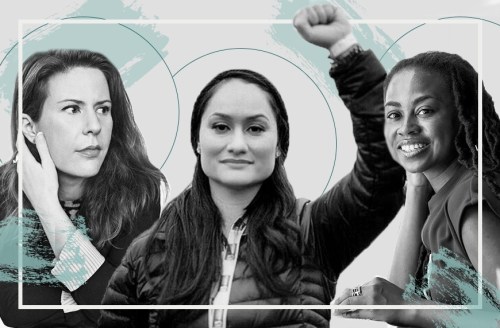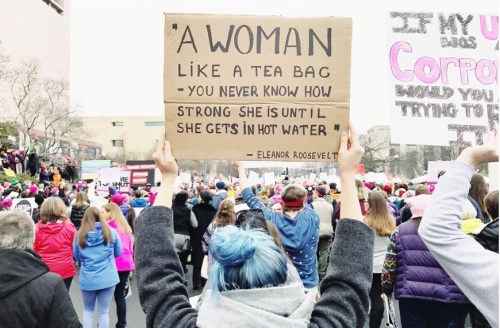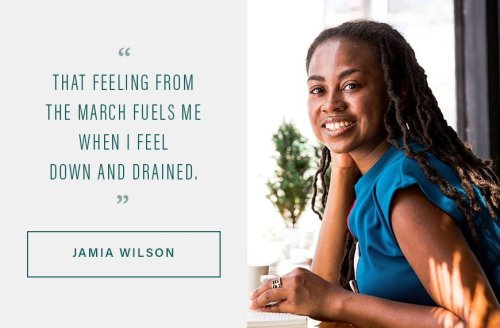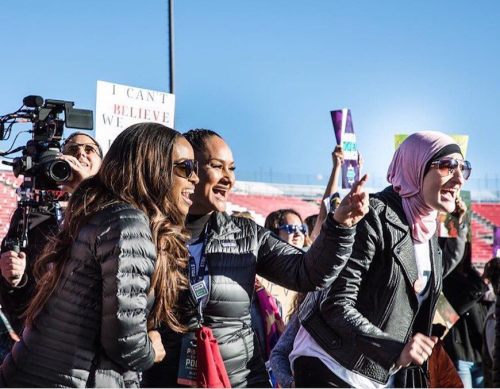Our editors independently select these products. Making a purchase through our links may earn Well+Good a commission
How the Women’s March organizers and activists are keeping the movement alive—without burning out
Latham Thomas speaks with the women of Together We Rise! on how they maintained their wellness regimens while on the road with the Women's March movement.

Did you hold your sign high at the Women’s March last January? Join an activist group in your community? Or have a fruitful Facebook debate with someone from across the aisle? And are you *exhausted*? The thing is, in order to take care of your community or your country, you first need to take care of yourself. That’s why Well+Good Council member and Mama Glow founder Latham Thomas sat down for a chat with the authors of Together We Rise!, a book about the Women’s March movement, to talk about all things wellness in this prime time of activism.
A dear friend of mine, Opal Tometi, one of the co-founders of Black Lives Matter, took a self-care sabbatical to give herself much-needed time to rest, recharge, and restore. Patrisse Cullors, another Black Lives Matter co-founder and the author of the new book When They Call You A Terrorist, ensures that when BLM organizes, there are stations with healers on deck to provide spiritual solace to support the work they’re doing to impact the community. Grammy-award-winning recording artist India Arie practices self-care through song, writing and singing her way to serenity when faced with the weight of injustice.
Mental and emotional health must be addressed as a critical part of our well-being in addition to our physical health.
Mental and emotional health must be addressed as a critical part of our well-being in addition to our physical health. Activism takes a toll on those on the front lines, but I know that many women at the helm of these social justice movements are helping to lead the next generation of activists to empower themselves with a self-care arsenal. It’s about taking care of your body and mind so you can be the most powerful version of yourself to do the work to best impact the community and world.
That’s why I caught up with some of my friends from the Women’s March—Carmen Perez, co-chair of the Women’s March on Washington; Cassady Fendlay, Woman’s March head of communications; and Jamia Wilson, activist, storyteller, and contributing editor of the new book Together We Rise!—to get their best tips for self-care in the midst of building a powerful movement.
Keep reading for our powerful convo about balancing activism, health, and positivity in order to lead a movement through uncertain times.

How do you stay well (in both body and mind) while being proactive in a movement?
Carmen Perez: For me, exercise is important, as well as recognizing the impact of prayer and consciously exercising gratitude. Every morning, before my feet hit the floor, I think of three things I’m grateful for. I also incorporate ritual and prayer into my work whenever I can. And I’m making time to meditate again by following a guided meditation on focus and positivity.
Cassady Fendlay: I’ve learned to prioritize and make space for my mindfulness because it prepares me to show up in movement spaces in the right state of mind. In organizing, every interaction counts. If you’re in a committee meeting and a racial micro-aggression happens, you’ve got to summon the energy and courage to address it. If you dismiss it because you feel too tired, or you weren’t paying attention because you were distracted, then you’re in the position of being complicit rather than being an ally. I’ve also learned that when I summon my breath in those moments of discomfort, it helps ground me in my values—so I can address something with courage.
Jamia Wilson: I’m learning to breathe in new ways. Recently I realized that I’ve essentially been holding my breath for years and that I need to breathe more freely and openly in order to thrive. I started doing breathwork with Kathleen Booker, the “Jedi of Calm,” after meeting her at Soul Camp last year. The results have helped me at work, in my personal life, and with managing anxiety and stress on top of a full schedule.

One woman holding a sign does not make a march. What role does community play in activism, but also in fighting against burn-out?
Perez: It’s important to build community around our cause. I lead a criminal justice task force called Justice League NYC, and the community we’ve built around it is one rooted in the ideology of nonviolence and radical love, which gives us the shared foundation to respond to a crisis or call to action by focusing on how can we address the deeper root causes. The beauty of the community we’ve built is that people take responsibility for different roles and we take turns carrying the load rather than have the burden fall on one person or the same few people.
The beauty of the community we’ve built is that we take turns carrying the load rather than have the burden fall on one person.
Fendlay: Community is one of the most beautiful and necessary things. None of us can thrive without it, but we also get bogged down in the misunderstandings and conflicts that come from being part of one. I focus on making sure my contributions to my community reflect my best effort, that I’m honest and compassionate, and I remind myself when problems arise that it’s almost never personal.
Wilson: Gloria Steinem often tells us that our activist community is our movement family. It’s true. The people in the movement with you will be there with you during all of your life challenges and triumphs, and you’ll grow together and learn from conflicts.

Traveling for your work adds another layer of exhaustion to your mission, which is something so many women can relate to. How do you take care of yourself while on the road?
Perez: I’ve learned to exercise boundaries—I can’t say yes to everything. I speak up for myself instead of feeling obligated to please others. Self-preservation is key, and I’m okay being by myself in my hotel room, going to the gym or the sauna, and finding food that makes me feel good versus feeling obligated to be out socializing.
Fendlay: On a really practical level, I’ve learned to bring certain foods and supplements on the road with me, like healthy protein bars and packets of greens powder. It gives me a sense of continuity in terms of how my body feels and responds to the stress of traveling. I also bought a foldable yoga mat that I pack and I try to do at least do five sun salutations in the mornings, which helps me feel like myself on the road.
Wilson: I have food allergies and some autoimmune conditions, so I prioritize sleep, hydration, and mindfulness. I pack gluten-free and dairy-free treats, and research restaurants before I make big trips and set boundaries that honor what I need to thrive. I’m also a big believer in vitamin D, oil of oregano, and fish oil. I’m powered by all three.

What was it like on a personal level organizing the largest gathering of women worldwide?
Perez: It was painful, it was powerful, but—most importantly—it was transformational.
Fendlay: I talk to people now and they think it must have been so cool and exciting, but it was the most stressful and exhausting 10 weeks of my life. I’m forever in awe of the ability of women-of-color leaders, Carmen, Linda, Tamika, and others, who’re able to take on so much while receiving so much hatred and vitriol from the public at large.
Wilson: It was an honor to bear witness to the organizer’s work by writing the oral history of the march, largely because I was able to experience the march as one of many participants. Because of their labor, I realized that we had the power and numbers needed to win the fight for freedom and justice. That feeling from the march fuels me when I feel down and drained.

Why is now such an important time for women to be vocal about their issues?
Perez: Our current political climate creates an urgency, and we all have a responsibility to make sure that women’s rights are not rolled back. We may have a sexist bigot in office, but if we all stand up collectively, then there’s no way they can take us down. That’s why it’s important that we show up for each other—because even if an issue doesn’t impact you directly, it may impact a woman you’re close to, or even a woman across the globe that you’ll never meet.
If we don’t define ourselves, someone else will.
Fendlay: We only make an impact when we’re vocal. Speaking up can be scary because it’s a risk and we’re going to say things that other people don’t like, but that’s where community comes in to support us. When one woman says, “This is wrong,” she’s speaking her truth. But when 100 other women join her in saying it, it becomes a demand for change.
Wilson: I always say that if we don’t define ourselves, someone else will. We get to decide how we want our children to know and remember us for generations. I want the next generation to know that I wasn’t complicit. I want them to know I believed in them, their liberation, and the power of the people.
This is why wellness has *always* played an important role in politics and activism. And these are the 4 questions to ask yourself in order to become an all-star leader.
Sign Up for Our Daily Newsletter
Get all the latest in wellness, trends, food, fitness, beauty, and more delivered right to your inbox.
Got it, you've been added to our email list.










